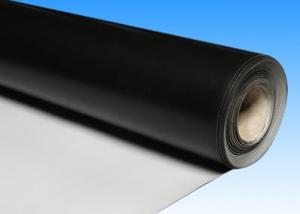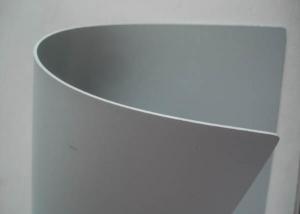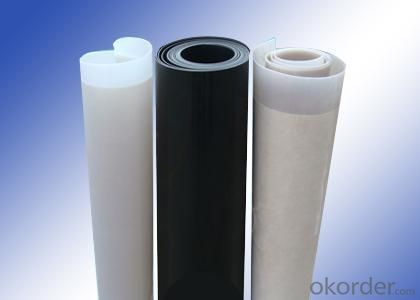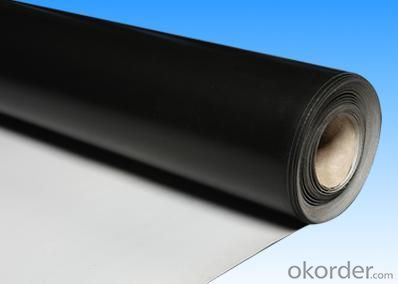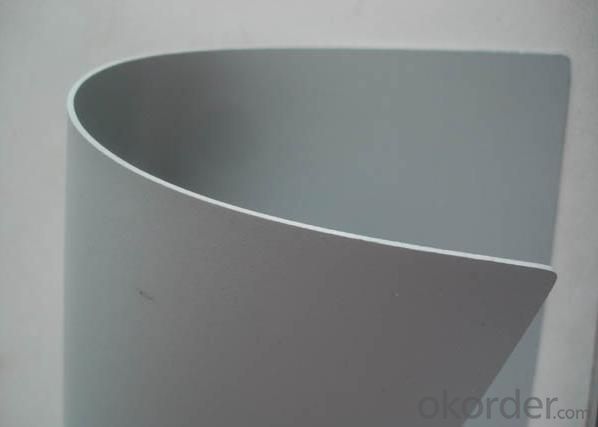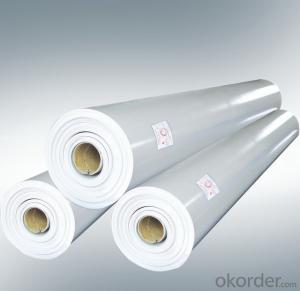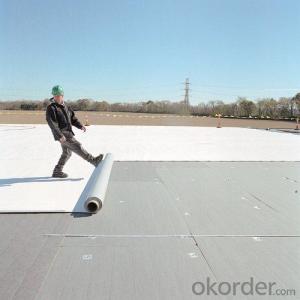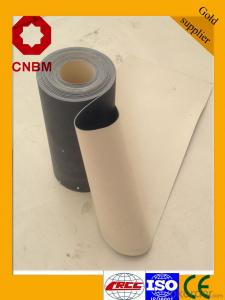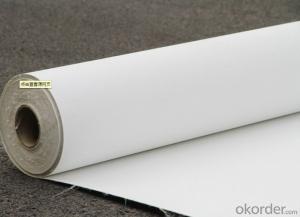High Quality Reinforced PVC Waterproof Membrane Forms
- Loading Port:
- Qingdao Port
- Payment Terms:
- TT or LC
- Min Order Qty:
- 1*20GP m²
- Supply Capability:
- 20 Containers Per Month m²/month
OKorder Service Pledge
OKorder Financial Service
You Might Also Like
Specification Of High Quality Reinforced PVC Waterproof Membrane From China
Width: 2m
Thickness: 1.2mm , 1.5mm , 2.0mm
Length: 20m
Application Of High Quality Reinforced PVC Waterproof Membrane From China
Reinforced PVC waterproof membrane forms an effective barrier to liquid water or water vapor in the roof construction for industrial and civil engineering, underground engineering such as subway & tunnel, water conservancy such as water pools & ditch, shelter, grain depot, land filling, dyke, sewage treatment and basement.
Install Of High Quality Reinforced PVC Waterproof Membrane From China
Hot air welding equipment to weld all overlapping joints on site, forming a seam stronger than the membrane itself
Pictures Of High Quality Reinforced PVC Waterproof Membrane From China
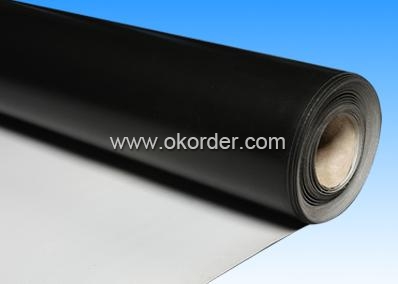
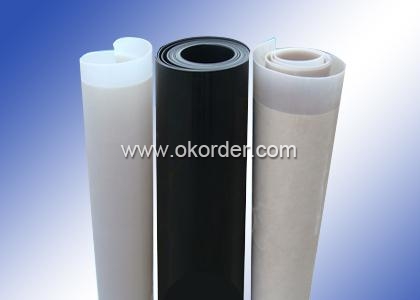
- Q: Are waterproofing membranes resistant to extreme weather conditions?
- Yes, waterproofing membranes are designed to be resistant to extreme weather conditions. These membranes are typically made from durable materials like rubber, PVC, or modified bitumen that can withstand the effects of harsh weather such as heavy rain, snow, strong winds, and extreme temperatures. They are engineered to be flexible, yet strong, ensuring that they can effectively protect structures from water infiltration even in the most challenging weather conditions. Additionally, waterproofing membranes are often treated with UV stabilizers to prevent damage caused by prolonged exposure to the sun's rays. Overall, these membranes provide reliable and long-lasting protection against extreme weather conditions.
- Q: Can a waterproofing membrane be painted over?
- Yes, a waterproofing membrane can be painted over. However, it is important to ensure that the membrane is clean, dry, and free from any debris or loose material before applying paint. Additionally, it is recommended to use a paint that is specifically designed for use on waterproofing membranes to ensure proper adhesion and longevity. It is also important to follow the manufacturer's instructions for both the waterproofing membrane and the paint to ensure compatibility and effectiveness.
- Q: SBs waterproof cold sticky how to do?
- Waterproof membrane cold sticking method construction points: 1, grass-roots inspection, cleaning. Cold sticky paste, the grassroots must be clean, dry, moisture content in line with design requirements, or easy to cause paste is not strong and drums. Therefore, before the construction, the grass-roots surface of the protrusions should be eradicated, and dust debris and other completely clean.
- Q: Can a waterproofing membrane be used in coastal areas?
- Yes, a waterproofing membrane can be used in coastal areas. These membranes are specifically designed to withstand harsh weather conditions, including exposure to saltwater, high humidity, and extreme temperatures. They provide an effective barrier against water penetration and can protect structures from the damaging effects of coastal environments.
- Q: Does a waterproofing membrane require any special tools for installation?
- Typically, a few special tools are necessary for installing a waterproofing membrane. These tools might include a utility knife or scissors for cutting the membrane to the right size, a trowel or notched trowel for spreading the adhesive or mortar, a roller or squeegee to ensure proper adhesion, a brush or sprayer for applying primers or sealants, and a heat gun or torch for activating self-adhesive membranes. Depending on the specific method of installation and type of membrane, other tools like a nail gun, stapler, or specialized fasteners may also be needed. To determine the exact tools required for a particular waterproofing membrane, it is crucial to refer to the manufacturer's installation guidelines and recommendations.
- Q: Can a waterproofing membrane be used for plant rooms?
- Yes, a waterproofing membrane can be used for plant rooms. Waterproofing membranes are commonly used in various applications, including plant rooms, to prevent water penetration and protect the structure from moisture damage. These membranes help maintain a dry and controlled environment, which is essential for the proper functioning and longevity of equipment in plant rooms.
- Q: Does a waterproofing membrane need to be primed before installation?
- Typically, before installing a waterproofing membrane, it is necessary to prime it. This priming process guarantees that the membrane adheres well to the substrate, forming a strong bond that prevents water from seeping through. The choice of priming material depends on the type of membrane and substrate used. Additionally, priming helps to seal any pores or cracks in the substrate, creating a smooth surface for the membrane to stick to. To achieve optimal results and ensure the long-term effectiveness of the waterproofing system, it is crucial to carefully follow the priming instructions and recommendations provided by the manufacturer.
- Q: Can waterproofing membranes be used on outdoor decks?
- Yes, waterproofing membranes can be used on outdoor decks. Waterproofing membranes are a popular choice for outdoor decks as they provide an effective barrier against moisture, preventing water from seeping through and causing damage to the underlying structure. These membranes are typically made of durable materials such as rubber or PVC and are designed to withstand exposure to the elements. They are applied directly onto the deck surface, creating a waterproof seal that protects the deck from rain, snow, and other forms of moisture. Additionally, waterproofing membranes can also help to prolong the lifespan of the deck by preventing water damage, rot, and decay. Therefore, using waterproofing membranes on outdoor decks is a practical and effective solution for maintaining the integrity and longevity of the deck.
- Q: Can a waterproofing membrane be used in swimming pools or water features?
- Yes, a waterproofing membrane can be used in swimming pools or water features. Waterproofing membranes are often used in these applications to create a barrier between the water and the surrounding structure. This helps prevent water leakage and damage to the structure, ensuring the longevity and durability of the swimming pool or water feature. The membrane is typically applied to the surface of the structure and can be made of various materials such as rubber, PVC, or bitumen. It is important to choose a membrane that is specifically designed for underwater applications to ensure its effectiveness in providing a watertight seal. Additionally, proper installation and regular maintenance of the waterproofing membrane are crucial to ensure its long-term performance.
- Q: How does a waterproofing membrane handle water infiltration through cracks or gaps?
- A waterproofing membrane is designed to handle water infiltration through cracks or gaps by forming a continuous barrier that prevents water from seeping through. The membrane is typically made of a durable and flexible material, such as rubber, PVC, or modified bitumen, which is able to withstand the movement and expansion of the underlying structure. When water encounters a crack or gap in the surface, the membrane acts as a sealant, preventing the water from penetrating further. The material used in the membrane is impermeable to water, meaning it does not allow water molecules to pass through its surface. Furthermore, the membrane is installed in such a way that it covers the entire surface area, including any cracks or gaps that may be present. This ensures that there are no weak points in the waterproofing system where water can infiltrate. In addition to its impermeability, the membrane is also designed to be flexible. This flexibility allows it to accommodate any movement or shifting of the underlying structure, without compromising its waterproofing capabilities. This is particularly important in areas where cracks or gaps may occur due to the natural settling or movement of the building. Overall, a waterproofing membrane effectively handles water infiltration through cracks or gaps by providing a continuous, impermeable barrier that prevents water from entering the structure. It is a reliable solution for protecting buildings and structures from water damage and maintaining their integrity over time.
1. Manufacturer Overview
| Location | Shandong, China |
| Year Established | 2003 |
| Annual Output Value | Above 50 Million RMB |
| Main Markets | Mid East; Eastern Europe; North America; Southeast Asia |
| Company Certifications | ISO 9001; ISO 14000 |
2. Manufacturer Certificates
| a) Certification Name | |
| Range | |
| Reference | |
| Validity Period |
3. Manufacturer Capability
| a) Trade Capacity | |
| Nearest Port | Tianjin; Qingdao |
| Export Percentage | 10% |
| No.of Employees in Trade Department | 5-10 People |
| Language Spoken: | English; Chinese |
| b) Factory Information | |
| Factory Size: | Above 2000 square meters |
| No. of Production Lines | Above 5 |
| Contract Manufacturing | OEM Service Offered; Design Service Offered |
| Product Price Range | Negotiated |
Send your message to us
High Quality Reinforced PVC Waterproof Membrane Forms
- Loading Port:
- Qingdao Port
- Payment Terms:
- TT or LC
- Min Order Qty:
- 1*20GP m²
- Supply Capability:
- 20 Containers Per Month m²/month
OKorder Service Pledge
OKorder Financial Service
Similar products
Hot products
Hot Searches
Related keywords

